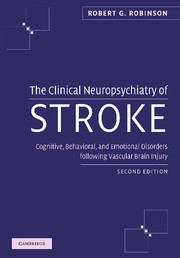 The Clinical Neuropsychiatry of Stroke
The Clinical Neuropsychiatry of Stroke Book contents
- Frontmatter
- Contents
- Preface
- Part I Introduction
- Part II Poststroke depression
- 5 Diagnosis of depression
- 6 Prevalence of depressive disorders
- 7 Phenomenology and specificity of depressive symptoms
- 8 Natural course of depression
- 9 Delayed-onset depression
- 10 Relationship to lesion location
- 11 Relationship of depression to cerebral dominance and structural asymmetries
- 12 Relationship of depression to bilateral hemisphere brain injury
- 13 Relationship of depression to physical impairment
- 14 Relationship to cognitive impairment and treatment
- 15 Relationship of aphasia to depression
- 16 Relationship of depression to social functioning
- 17 Relationship to premorbid risk factors
- 18 Mortality and treatment
- 19 Suicidal thoughts and plans
- 20 Biological markers
- 21 Mechanisms of poststroke depression
- 22 Treatment of poststroke depression
- 23 Prevention of poststroke depression
- Part III Poststroke mania
- Part IV Poststroke anxiety disorders
- Part V Other poststroke disorders
- Index
14 - Relationship to cognitive impairment and treatment
from Part II - Poststroke depression
Published online by Cambridge University Press: 01 October 2009
- Frontmatter
- Contents
- Preface
- Part I Introduction
- Part II Poststroke depression
- 5 Diagnosis of depression
- 6 Prevalence of depressive disorders
- 7 Phenomenology and specificity of depressive symptoms
- 8 Natural course of depression
- 9 Delayed-onset depression
- 10 Relationship to lesion location
- 11 Relationship of depression to cerebral dominance and structural asymmetries
- 12 Relationship of depression to bilateral hemisphere brain injury
- 13 Relationship of depression to physical impairment
- 14 Relationship to cognitive impairment and treatment
- 15 Relationship of aphasia to depression
- 16 Relationship of depression to social functioning
- 17 Relationship to premorbid risk factors
- 18 Mortality and treatment
- 19 Suicidal thoughts and plans
- 20 Biological markers
- 21 Mechanisms of poststroke depression
- 22 Treatment of poststroke depression
- 23 Prevention of poststroke depression
- Part III Poststroke mania
- Part IV Poststroke anxiety disorders
- Part V Other poststroke disorders
- Index
Summary
Cognitive impairment and stroke
There are numerous studies which have demonstrated cognitive impairment associated with of specific regions of cerebral infarction (Gazzaniga 2000). Although the focus of this chapter will be on the relationship between depression and cognitive impairment, it is worthwhile to review some of the recent studies which have documented the frequency and severity of cognitive impairment associated with stroke. Perhaps the most well-designed study is the one involving the Framingham cohort (Kase et al. 1998). They prospectively studied a group of 74 subjects who had suffered a stroke during a 13-year follow-up and compared them with 74 control subjects who had not suffered a stroke, but were matched for age and sex. The patients who suffered a stroke were noted to have a significantly lower mini-mental state exam (MMSE) score at prestroke baseline (i.e., 27.3 ± 0.3, stroke and 28.1 ± 0.2, control). Following the stroke, however, the mean MMSE in the affected group was 23.6 ± 0.9 compared with a mean mini-mental score of 28.3 ± 0.2 (p < 0.001) in the control patients. The decline in cognitive function was correlated with large left-sided strokes as documented on CT scan. The Framingham Study also found that the Center for Epidemiological Studies – depression scale (CES-D) scores indicated significantly more depressive symptoms in the patients with stroke compared with controls.
- Type
- Chapter
- Information
- The Clinical Neuropsychiatry of StrokeCognitive, Behavioral and Emotional Disorders following Vascular Brain Injury, pp. 148 - 170Publisher: Cambridge University PressPrint publication year: 2006
- 1
- Cited by


